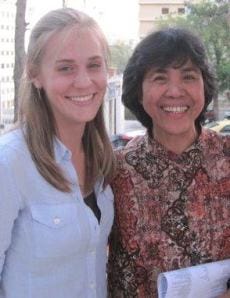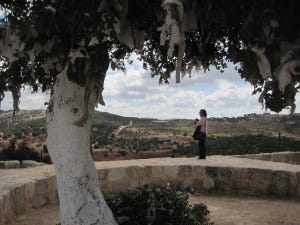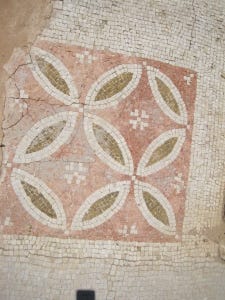'The Way of Perfection'
From the Midwest to the Middle East, sisters and lay women carry on the legacy of St. Teresa of Avila
For the feast of Saint Teresa of Avila, I wanted to share this reflection, which I originally wrote ten years ago on October 15, 2014. It has been edited slightly.
(If you use the Substack app, you can listen to this post read aloud.)
Today is the feast day of Teresa of Avila, the saint whose name I took at my confirmation. Teresa is a looming figure in Catholic history. A reformer, writer, and mystic, she was one of the first women to be named a Doctor of the Church, an honor which acknowledges the saint’s important theological contribution to the Church. Her writings, which discuss busy-ness, distraction, and dryness in prayer, seem written to a modern audience stuck on their iPhones and tied to their G-Cals.
Teresa has not only impacted me through her spiritual writing, which I’ve written about here, but also through the women who carry her Carmelite charism. I’d like to share a bit about two groups of women—one in Indiana and one in Amman, Jordan—who have supported and inspired me.
The Carmelites of Indianapolis at the Monastery of the Resurrection
As a child, I often attended Mass with my family at the Carmelite monastery in Indianapolis. Each week, a local Jesuit priest (from my future high school, Brebeuf) would say Mass for the dozen or so sisters and a diverse group of Catholic lay people, including those in openly gay partnerships. The service was different than any other Mass I’d been to before, or have attended since. We sung the Gloria with non-gendered language; we passed the Eucharist throughout the rows and consumed it together; and we sat quietly after Communion, meditating as a song played from the CD player in the corner. The radical equality and solidarity preached by Jesus was mirrored in the Mass. I will never forget the soft, high voices of the sisters singing, or the passion with which Sr. Terese proclaimed the readings.
Traditionally, Carmelites were a cloistered order which never left the monastery. In the early 2000s, these sisters still maintained a simple life of prayer, silence, and community within the monastery, but they often ventured out into the community to see the Harry Potter movies and go to Target. They were funny, relatable, and smart, reading dozens of newspapers and magazines each week to keep abreast on current affairs. This self-education about current events was another way they stayed connected to the world outside their walls. After reading about the Iraq War, the sex abuse scandal, or the Second Intifada, they would come together and pray, lifting up the suffering to God. Eventually, their prayer and reflection moved beyond the monastery in a more concrete way—through PraytheNews.com, a website developed by my dad’s advertising agency. The site featured the sisters’ prayerful commentary on world events, in addition to resources about Carmelite prayer and the history of the order.
These sisters taught me what it means to be socially conscious, and convinced me of the efficacy of prayer even when prayer seems hopeless. Through their encouraging words every week, they helped to nourish my vocation—something I can only recognize now with hindsight. They are still some of my biggest cheerleaders and I continue to correspond with Srs. Terese and Jean Alice now and then.
Because of the sisters’ old age and small numbers, they had to discontinue the PraytheNews website and move from their beautiful, stone monastery to another religious community in eastern Indiana. But their impact is still felt through their prayers.
Elisa and Amabel: Teresians in Amman
I first met Elisa and Amabel in 2012, when I lived in Amman, Jordan during college. The two women helped out with the English-language Mass I attended—Elisa orchestrated the readers and Eucharistic ministers, while Amabel played guitar for the music ministry. They were friendly, kind faces, but I didn’t get to know them well until I returned to Jordan on a research grant in the fall of 2013.
I was quite emotional on my first Sunday back in Amman, unsure if I could manage for nine months away from family and friends. When I walked into Mass, Elisa immediately recognized me, gave me a hug, and asked me, “Would you like to read?” She, like the Carmelites of Indianapolis, also knew how to tend my vocation—since I was a child, I’ve enjoying participating in the Mass by reading the Scripture passages. Of course I said yes. Sitting in the pew trying to pray before Mass began, I was still overwhelmed by the transition to my new home. Elisa noticed I was upset, came over, and scooted next to me on the pew. “It is so nice to have you back,” she said. “We’re glad you’re here.” Her hospitality and welcome caused me to cry a new wave of tears, one of gratitude and relief. This interaction was a sign of the friendship that would emerge over the next year.
Elisa and Amabel both work at the Pontifical Mission Library, an institution of the Catholic Church which serves the whole community, Christian and Muslim. Children and adults alike come to check out books in Arabic and English, and to participate in religious events or skills workshops. I made use of the library as well, coming on free mornings to work on my research.
Originally from the Philippines, Elisa and Amabel have spent decades in Jordan. Elisa has been with the library since she helped open it in the Jabal Hussein neighborhood 40 years ago. Both women are members of the Teresians, a community of lay men and women who live out the spirituality of St. Teresa and the Carmelites. Their members are spread around the world, and most work in educational ministries. As single women, Elisa and Amabel live together in an apartment with a chapel, and every Friday, they welcome foreign workers—many of them Filipino—into their home for a meal. Elisa and Amabel serve and live among struggling but ordinary communities: Palestinian refugees, domestic workers, the elderly and the sick. They live out the Gospel injunction to “love thy neighbor” with sincerity and humility, attempting to walk with Jesus throughout their day. During my visits to the library, Elisa and I would often talk about her prayer life, how she was relating to Jesus and what he was teaching her. Usually, the message was about trust—something I constantly needed to hear. I now wish I had written down those conversations.
One afternoon in October 2013, Elisa and Amabel took me with them on a mini-pilgrimage to two holy sites in northern Jordan. One of them was Tell Mar Eliyas, or the Mount of St. Elijah. Legend holds that the biblical figure Elijah was born in a town in northern Jordan, and that as a child he would climb a nearby mountain to pray. Centuries later, the Byzantines built a large church on this mountain. Now it is in ruins, but its intricate mosaic floor is partially in tact today. At one end of the ruins is an old tree, with many ribbons and pieces of cloth tied to it. Muslim pilgrims also come to the site with particular petitions and pray to Elijah to intercede for them.
Elisa, Amabel, their friend, Petra, and I explored the site and sat in silent prayer alone. The Carmelites’ style of prayer is characterized by silence, and they trace this emphasis back to Elijah, who was unable find God in the storm, the wind, or the fire, but in calm silence. Though I was struggling with my prayer life at the time, I was moved to visit the place where Elijah prayed as a child, where Carmelite spirituality got its start.
Teresa’s women
I am so grateful to these women of St. Teresa, both in the Midwest and the Middle East, who have supported me in times of growth and struggle, and who model Teresa’s challenging “way of perfection.” For her, this avenue to God was not defined by the avoidance of sin, but rather by self-giving love.
Through their humble service, my Carmelite friends live out this saying of St. Teresa, which might as well have been uttered by Jesus Himself: The important thing is not to think much, but to love much and so do that which best stirs you to love.
You might also like these posts:













Lovely! Bless you, thank you Jordan. You do such fantastic work. Much love in Christ from here in the UK to you and all your family. Paul
Thank you, Jordan. I lived with Teresians one summer in Madrid . Only later did I understand what
I was experiencing.
Bettyblackerby@yahoo.com